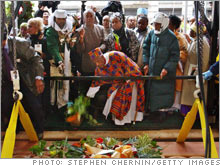(Fortune Magazine) -- One of the many joys of the World Cup is engaging in a 30-day frenzy of flag-hugging nationalism. Many Americans root for more than one team: the U.S. and the country of their ancestors. If you're vaguely German, your veins pop when a bad call goes against Team Germany. Third-generation Italian? Your wardrobe isn't complete without the stylish blue jersey of the Azzuri.
Every four years I pick an African team to support. Last summer it was Angola. In 1998 I was a Nigerian for a day, celebrating in a West African bar as their team upset Spain, 3-2. But I knew I was an interloper. As a black American, when the red-white-and-blue is not on the field, who is my team?
 |
| The African burial ground: This historic site helped launch Kittle's business. |
This query, of course, goes deeper than sports. Yes, I'm African American, but what does that mean? Where on the vast 12 million-square-mile continent does my ancestral lineage originate? Who are my people? I assumed those questions were unanswerable. Even the most intensive genealogical research is unlikely to tease out the ethnic and regional origins of the millions of descendents of Africans who crossed the ocean as chattel.
The reasons are myriad. During the three-century-long trade, most slaves came (and were shipped) from the far-western curve of Africa that stretches from Senegal to Nigeria. But as a result of wars, migration and trade, Africans from other parts of the continent also were captured.
Before the voyage across the Atlantic, tribe members were almost always separated to prevent them from plotting rebellion. Once they arrived on plantations, they were discouraged from practicing tribal customs.
As time went on, slaves intermarried; linguistic links were cut as they often took the last names of their owners. To further confuse the issue of genetic origin, many slave women bore white men's children, either the result of rape (a common occurrence) or more complicated relationships, such as that of Sally Hemings and Thomas Jefferson.
After emancipation, many families tried to bury the sadness of slavery, and didn't talk much about the past. All this served to create a uniquely African-American identity. But individuals were unable to trace their ethnic heritage to a point of origin in Africa itself.
Until now. Science has made it possible for black Americans (as well as blacks in the Caribbean and Latin America) to take a genetic test that can help them breach the barriers of history.
A building site provided the lever. In 1991 a construction crew digging in lower Manhattan uncovered a 17th- and 18th-century graveyard housing the remains of some 400 Africans. Six years later Rick Kittles, a professor of genetic medicine at the University of Chicago, joined a team of Howard University scientists and historians to study the site.
In order to determine the origins of these black New Yorkers, Kittles took genetic samples from the remains and attempted to match them against present-day Africans. But the existing databases were too small to make credible matches. So Kittles began collecting samples himself, as well as buying and borrowing from other companies and academics. Today his 25,000-sample compilation is the world's largest storehouse of African DNA and is the cornerstone of African Ancestry Inc., the company Kittles co-founded in 2003.
"Every generation comes up with the same questions," notes Kittles, who says he had always been haunted by the mysteries of his tribal heritage. "But when we use the traditional methods other people use to research the family tree, we hit a wall. As a geneticist, I knew the wall could be overcome."
African Ancestry came along at just the right time. Some 73 percent of Americans say they are interested in researching their family history, according to a 2005 poll by Marketing Strategies Inc. That's up from roughly 50 percent a decade ago. Three factors seem to be driving this interest. First, raw historical records, such as census data and birth and death certificates, have become easier to access because of the Internet. Software has made it easier to catalog data on home computers. And finally, DNA testing has become less expensive and more readily available.
Although the history of slavery presents peculiar roadblocks - particularly poor record-keeping of slave births and deaths - African Americans are no less interested in their families' past. African Ancestry's business has doubled in each of the past four years; all told, it has served 10,000 customers.
Throughout the year, Kittles zigzags the country, giving lectures on DNA research to black churches and community groups. But business really took off in early 2006 when, as part of a PBS miniseries on the ancestral ties of African Americans, Harvard historian Henry Louis Gates Jr. used Kittles's analysis to link nine famous African Americans, including Oprah Winfrey, Quincy Jones and Whoopi Goldberg, to their African homelands.